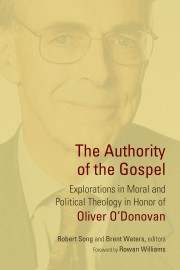Reviewed by Jacob Shatzer
Oliver O’Donovan has rightly earned a reputation as “one of the pre-eminent Protestant Christian ethicists of the present time” (xi). His Resurrection and Moral Order, Desire of the Nations, and Ways of Judgment demonstrate his significance, as do the first two volumes of his three-volume Ethics as Theology series. The Authority of the Gospel, however, attests to O’Donovan’s reputation in a different way, as former students, faculty colleagues, and academic peers honor his retirement with their contributions. Each essay “is an attempt to show how each of the contributors have been enabled to develop their own thinking through serious engagement with his work” (xii). One way to measure the greatness of a thinker is to analyze his work; another is to put his influence on display through the works of those he has influenced and shaped, as this volume does.
Rather than attempt a summary of each chapter as the editors capably provide in the introduction, I will briefly mention the various interests that will find the volume profitable. First, anyone interested in the work of O’Donovan will find the volume helpful as the contributors develop themes relevant to his broader work. Second, students of Augustine—familiar with O’Donovan or not—will find the book interesting because several of the authors explore and expand O’Donovan’s use of Augustine. For instance, Bernd Wannenwetsch’s “A Love Formed by Faith” treats the relationship of love and faith in both Luther and Augustine in relation to O’Donovan’s work and contemporary ethical concerns. Third, political theologians will find the book useful as well, since several contributors develop these themes from O’Donovan’s oeuvre. Eric Gregory, for example, asks and answers the question, “How are the morals of the res publica related to beatitude, if at all?” (75). Fourth, anyone interested in contemporary ethical issues such as just war, marriage and family, and identity politics, will find intriguing essays on those topics. Nigel Biggar’s essay defending the Iraq War, John Witte, Jr.’s contribution on Scottish Common Sense philosophy’s contribution to traditional marriage laws, and Robert Song’s chapter on body integrity identity disorder as a way to approach a Christian understanding of identity in a fallen world are some of the strongest pieces on the book.
One thing not to expect from this volume, however, is much new from O’Donovan. His “Know Thyself! The Return of Self-Love,” which concludes the volume, is almost identical to chapter 3 of O’Donovan’s Finding and Seeking: Ethics as Theology 2 (as O’Donovan himself acknowledges in that volume; see “Preface”).
Though this quality hardback volume’s cost is relatively high, the strength of its essays makes it worth considering. It ends with “Publications by Oliver O’Donovan” which will prove useful for future scholars continuing to assess the contribution and significance of this able scholar.
Jacob Shatzer is Assistant Professor of Biblical and Theological Studies Sterling College and Book Review Editor for Ethics here at Books At a Glance.
Buy the books

The Authority Of The Gospel: Explorations In Moral And Political Theology In Honor Of Oliver O'donovan